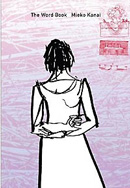

Dalkey Archive Press, paperback, 9781564785664
It took me a while to appreciate the many virtues of The Word Book. Having just come off reading a run of novels, I dived into these stories too fast, and had to lift my head out of the water, make a conscious decision to slow down, and then proceed at a more leisurely pace before I got into their curious and slantwise flow.
These 12 short stories are structured around distinctive elements and motifs that recur in various combinations. Among them are trains, the passage of time, milk, water, movies, sex, and fiction itself. Narrators change gender, age from childhood to adulthood in a paragraph, and circle back on themselves. As the book proceeds, the stories increasingly intertwine, so that the last few are chamber-music variations on each other.
In terms of subject matter and narrative technique, these stories reminded me a lot of Jorge Luis Borges, and at times of J. G. Ballard. But the sensibility is quite different: in place of the chilly detachment which some find in Ballard and Borges, Mieko Kanai's prose foregrounds sensual details: a lover's sweaty body, the rich vegetation of a park, the rhythm of a moving train. The thinking, feeling subject, often withdrawn in Borges' stories, and even more so in Ballard's, is fully present in The Word Book.
Of the stories, "The Rose Tattoo", with its debt to Borges clearly signaled in the narrator's father's occupation as violinist in a tango orchestra—albeit a tango orchestra in Beijing—is more linear than most of these narratives, with its gangsters, knife-fights and illicit love. "The Boundary Line", full of dark water and floating bodies, reminded me of Ballard, but the hero does not have the Ballardian drive to surrender to entropy. (Many of these stories' narrators are male, or at least, they start out that way.)
Enough of comparisons. The Word Book has its own distinctive concerns, its own distinctive tone, precise yet contemplative. As it nears its conclusion, the stories intertwine more and more closely, so that the same sequence of events—so far as it can be reconstructed as a sequence—replays itself from a number of different angles, seen in different lights.
Throughout this collection, identity is fluid and insecure. At the end, it has broken down altogether, "turning into numberless persons who are no one at all". It's the success of The Word Book that, by the time you get to the end of the final story, that dissolution feels like a cause for celebration.
To summarise, then: This is not the book for you if you are looking for linear narratives, rounded characters, and
fully resolved plotlines. But if you are willing to take a few deep breaths and dive into a pool of narrative that
swirls around you as you read, I think that you will find The Word Book well worth the effort.
